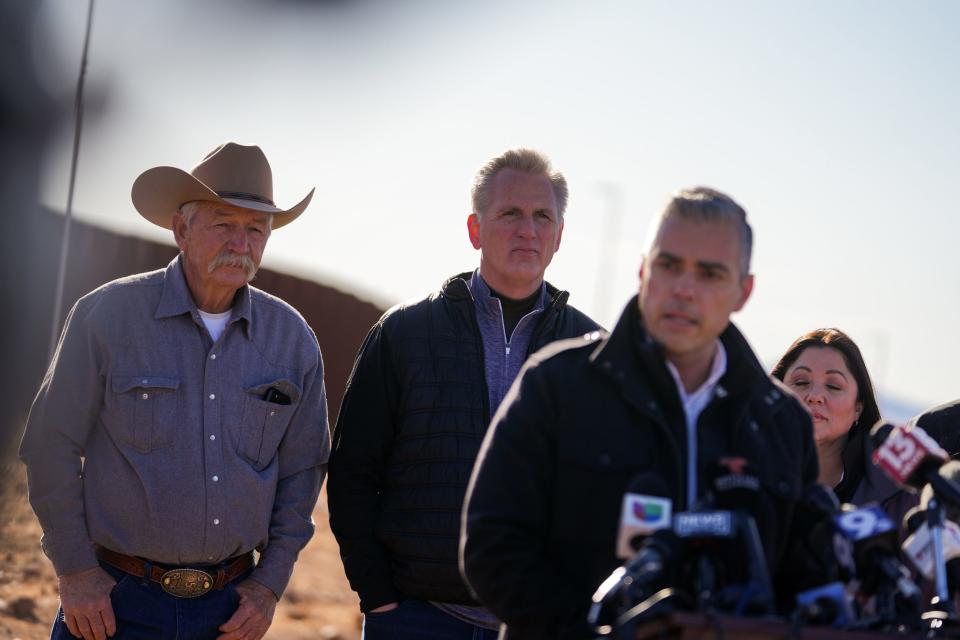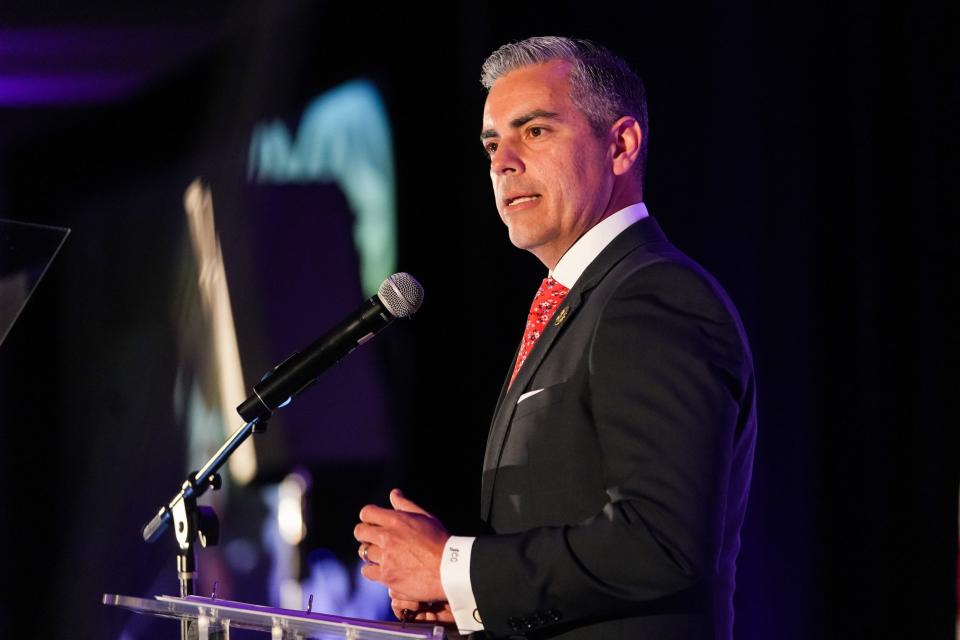This Arizona Republican congressman is taking a bipartisan approach to legislating
- Oops!Something went wrong.Please try again later.
- Oops!Something went wrong.Please try again later.
- Oops!Something went wrong.Please try again later.
Freshman Rep. Juan Ciscomani is one of the rising Republican stars in Congress.
A top recruit of Rep. Kevin McCarthy, R-Calif., to run for office, Ciscomani, R-Ariz., nominated McCarthy for speaker of the House during one of the 15 rounds of votes it took for McCarthy to win the gavel.
He was the only freshman picked by House leadership to sit on the prestigious House Appropriations Committee. Ciscomani also was tapped to deliver the Republican Spanish language response to President Joe Biden's State of the Union address. In his remarks, Ciscomani talked about how his life is the embodiment of the American Dream.
In November, Ciscomani defeated his Democratic opponent, former state Sen. Kirsten Engel, but the race was much closer than many anticipated. Engel has announced her intention to run again in 2024, setting up a possible rematch of the 2022 congressional battle.
While still clearly conservative, Ciscomani has kept in mind the demographics of the district reflected in the closeness of the race when legislating. That is demonstrated by the bills he has introduced in Congress and his bipartisan Citizen Advisory Council.
Ciscomani replaced former Rep. Ann Kirkpatrick, D-Ariz., after she declined to seek reelection. He represents Arizona's new 6th Congressional District, which the state's Independent Redistricting Commission, the body tasked with redistricting last year, considers "highly competitive." However, the newly configured district, which includes the edges of Tucson and parts of Pima County, as well as sections of Cochise, Graham, Greenlee and Pinal counties became much more Republican than it was under Kirkpatrick.

What did Ciscomani do before Congress?
Ciscomani moved to Arizona when he was a young child from Mexico and made history as the first naturalized American to represent Arizona in Congress.
"If you talk to my dad, he'll say, 'Where else in the world can we have our story?' We came to this country, we learned English, we immersed ourselves in the culture, we became citizens — I drove a bus most of my life, and my son is now a member of the United States Congress," he said in his Spanish language response to Biden's primetime address.
Ciscomani's successful congressional bid was only his second political race. When he was 25, he ran for the Arizona House of Representatives to represent what was then Legislative District 29 in an area that was heavily Democratic.
After that race, Ciscomani decided to focus more on his family, learning and getting a job, which he described as "all the things that I think are helpful when you're running for office."
Ciscomani, 40, said that having more life experience has made him a better representative in Congress.
"People ask me all the time: 'How do I end up running for office?' I tell them: 'go live ... get a job, start a business, and ... that will eventually get you there.'"
Prior to running for Congress, Ciscomani was a senior aide to former Republican Gov. Doug Ducey for nearly eight years. That's where he learned about governance at a state level.
"I got a lot of experience there of how much we can do from government and the areas that we can impact," he said. "I got to tell you, I really enjoyed the state government side of it. I worked for, I think, a great governor and we got a lot accomplished."
Ciscomani said that working at the state level made him realize that he wanted to have a broader impact on policy.
"I realized that a lot of the (issues I cared about) fell into the federal side of jurisdiction. So I decided to run for Congress to be able to impact that," he said.
Arizona elections: Democrats believe abortion issue can topple freshman Rep. Juan Ciscomani
Ciscomani talks about his approach to legislating
The political demographics of the 6th Congressional District are reflected in Ciscomani's approach to legislating.
"I represent a district that is roughly a third Republican, a third Democrat and a third independent," he said, noting that in addition to Kirkpatrick, the district previously was represented by Reps. Jim Kolbe, R-Ariz.; Gabby Giffords, D-Ariz.; Martha McSally, R-Ariz.; and Ron Barber, D-Ariz.
"It's a district that really likes the person, the ideas. And ... instead of calling it a swing district, I would say it's a split district," Ciscomani said. "You have to bring forward ideas and results. And so my approach is always let's work with anyone that wants to bring back results."
Paying tribute: Ciscomani wants to rename Patagonia post office in honor of this former Congress member
Ciscomani has created a Bipartisan Citizen Advisory Council
Ciscomani's willingness to work with both sides of the aisle in Washington extends to Arizona through his Citizen Advisory Council. The 40-member council, which is headed by three co-chairs: a Republican, a Democrat and an independent, works together to find consensus across different ideological lines.
"An idea that I had in the campaign that some told me may not be possible in today's age: ... I wanted to form an advisory council that can represent the district, all five counties from different walks of life: water experts, defense, small businesses, nonprofits, you name it, I wanted it all," he said. "A great mix of everything. ... Republicans, Democrats and independents that could work together."
After Ciscomani won the election in November, he called each member of the council and asked him or her to join. Every single person accepted Ciscomani's invitation.
"And the rules ... of the council are simple. Just be able to work with someone that is right next to you regardless of their party affiliation. Let's work on the issues that we agree on and where we disagree, we'll be OK with disagreeing," he said.

"I think that's the idea that I'm bringing to the table and what my district calls for," he added. "I'm pretty much an independent voice in this and I'll vote and represent my district in the best way possible."
Ciscomani said the advisory council is a place for him to get feedback on policy ideas and find solutions to issues like jobs and even border security that have bipartisan consensus.
Ciscomani says that he learned to work with others as a result of the political convictions he held where he was raised.
"Growing up as a first-generation Hispanic Republican in Pima County, you ... work with people that you won't always agree with, but you always find common ground. And that's one thing that I developed throughout my years working in the county and in the city where most people are not Republican," he said. "And whether we agree with someone with 90% or 10% of what they say or do, we can .... focus on that."
"Now, my principles are our firm. I'm a conservative and that's how I'm governing," he added. "But that doesn't mean that we don't listen or the door is shut for ideas."
Make your voice heard: How to contact your member of Congress
Ciscomani's bills reflect his bipartisan approach
Ciscomani's willingness to work with anyone is reflected in the bills he has sponsored.
His first four pieces of legislation have had bipartisan co-sponsors.
Because he also sits on the House Committee on Veterans' Affairs, two of Ciscomani's bills involve veterans. The first would create a program that would incentivize new lawyers and law school students to process disability claims in cooperation with judges. The legislation is trying to cut down on veterans' wait times, which can take years.
The second piece of legislation would involve training veterans and service members who are about to leave active duty with skills needed to join the workforce.
The third piece of legislation introduced by Ciscomani involves turning Chiricahua National Monument into a national park. Sen. Mark Kelly, D-Ariz., introduced companion legislation in the Senate, which is also co-sponsored by Sen. Kyrsten Sinema, I-Ariz.
"These are bills that just make sense. ... These are just good ideas that have bipartisan support that should be law," Ciscomani said.
In another bipartisan bill, Ciscomani sponsored reauthorizing the Udall Trust Fund. The fund is overseen by the Udall Foundation, a federal agency not beholden to any administration, that funds research related to the environment and Native American and Alaskan health and tribal policy. It also promotes training and sponsors environmental conflict resolution.
The fifth piece of legislation Ciscomani sponsored was the Transnational Criminal Organization Illicit Spotter Prevention and Elimination Act, which stiffens the punishment for people who assist cartels by raising the fine and instituting a maximum prison sentence of a decade.
The sixth bill Ciscomani sponsored was to designate copper as a critical mineral as part of the Energy Act of 2020. The goal is to help the government establish a more dependable reserve of copper going forward as the amount of copper has become less available in recent times. Arizona produces 70% of the country's copper.
Only Republicans cosponsored that bill in the House. They include Reps. Eli Crane, Debbie Lesko and David Schweikert of Arizona. However, Sinema sent a letter with a bipartisan coalition of senators, including Kelly, to ask Interior Secretary Deb Haaland to denote copper as a critical mineral.
The final bill Ciscomani sponsored would rename a post office in his district after the late Rep. Jim Kolbe, R-Ariz.
Here's what Ciscomani is doing on the Appropriations Committee
One indication of the House leadership's belief that Ciscomani is destined for political advancement is through his committee assignments, particularly that of the House Appropriations Committee.
"I'm very honored and proud of that. Not a lot of freshmen get on this committee ... and in this Congress, there was only one," he said. "You sit by seniority. So I sit at the very edge of the table right now. But I'm at the table and that's what really matters."
Ciscomani is in a unique position as the sole Arizonan representative on the committee. As such, he said that he has communicated with the state's congressional delegation to see what is important to them and their constituents.
"I want to be informed about their priorities so that I can be an advocate for Arizona on this committee. I want Arizona to win," he said, adding that his "priority will always be to represent CD6."
Ciscomani aims to ease tension between federal and state government
Working with Ducey, Ciscomani has perspective on what it is like for state-level politicians to interact with their U.S. representatives.
Ciscomani said that during his time working for the Ducey administration "focused on having communication with the entire delegation."
Still, there is usually tension between national and state representatives, especially when they belong to opposite sides of the aisle. Arizona's House delegation consists of six Republicans and three Democrats while the top three state elected officials are all Democrats.
He said he hopes his relationship with Democratic Gov. Katie Hobbs gets better.
"I really hope that we can improve on that because it's not about party line on this," Ciscomani said. "We need to make sure that we're in good shape, especially on water, transportation. These are issues that we need to put all the partisanship aside."
SUBSCRIBE TODAY: Act now, to get the best in local journalism. Subscribe at https://subscribe.azcentral.com/offers.
Tara Kavaler is a politics reporter at The Arizona Republic. She can be reached by email at tara.kavaler@arizonarepublic.com or on Twitter @kavalertara.
This article originally appeared on Arizona Republic: Juan Ciscomani takes bipartisan route in Congress, Arizona politics

